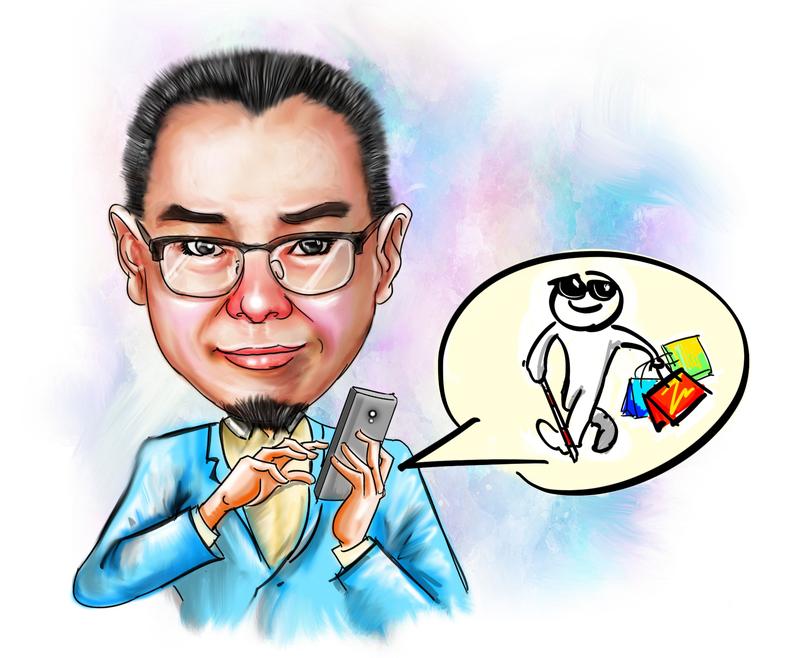 (BILLY WONG / CHINA DAILY)
(BILLY WONG / CHINA DAILY)
SHENZHEN – Shen Guangrong, a young coder in Shenzhen, enjoys discussing computer technologies with friends on the internet, but the people he chats with are usually surprised to learn he was born visually impaired.
He can use online messaging apps and also has learned coding and programming on his computer. Now the 23-year-old computer engineer is working in a technology startup that is dedicated to providing online accessibility for people like him.
On the Chinese mainland, about 1.7 million visually impaired people have trouble reading online information, and thus they miss out on the conveniences that the technology provides.
Shenzhen-based Link Accessibility Co Ltd came up with a solution to optimize websites and mobile phone applications so that visually impaired users can hear information on the screen.
If we look at an internet platform as a building, our product is like an elevator, while service directly for individual users are wheelchairs, but not all buildings are wheelchair-friendly.
Liang Zhenyu, Founder, Link Accessibility Co Ltd
With this solution, words on the screen, emojis, and even operating actions, such as editing or adding an item to a cart, are “translated” into audio clips. Wherever the user’s finger goes, the audio follows, and the user needs only to click when he or she hears the desired option.
The startup is derived from Shenzhen Information Accessibility Research Association, an NGO founded in 2005 to provide computer training for visually impaired people. After Liang Zhenyu took the helm of the NGO, he established Link Accessibility to extend more services for the disabled population.
“Information accessibility means enabling as many people as possible to access information in different kinds of scenarios by making use of technologies, so that we can all share modern civilization fairly, conveniently and indistinguishably,” Liang said.
But many other firms offer similar services, said Luo Yan, analyst at Social finance and Social Innovation Center at the China Global Philanthropy Institute.
She said most suppliers for this kind of service in the market regard individual users as their clients, but it is a challenge for most people in this group to afford such special services without the financial support of a government or charity.
The business model also encounters obstacles along its industrial chain for long-term development, she added.
Liang said that his company sells the service to internet product developers instead of individual users, and the technology behind it is totally different.
“If we look at an internet platform as a building, our product is like an elevator, while service directly for individual users are wheelchairs, but not all buildings are wheelchair-friendly,” he said. An “elevator” is the way to fundamentally solve the problem, he added.
RELATED ARTICLES
However, promoting the idea has not been easy. He recalled many internet companies did not, and some even now still don’t, know their websites or other online products can be used by visually impaired customers. He was even called a liar once.
His strategy is to impress them with practical demonstration and down-to-earth benefits, instead of talking only about social value. “This group of people can present a new market for online platforms, and it is very valuable as the cost of attracting new users online is escalating rapidly now,” he said.
“With the increasing information accessibility on these platforms, the consumption potential of new disabled customers will also be unleashed, a fact that can encourage these developers to pay for the upgrade.”
So far, it has provided solutions for about 40 mainstream internet productions, including WeChat, Taobao and car-hailing company Didi Chuxing, Liang said.
Taking the e-commerce platform Taobao as an example, there are on average 300,000 visually impaired online shoppers every day, according to Alibaba.
Internet giant Tencent’s online messaging tool QQ also added accessibility for visually impaired users, and these special functions were used more than 160 million times in 2018.
In addition to software companies, Chinese hardware makers, such as Huawei, are also catching up as far as offering accessibility.
Looking into the future, Liang believes national authorities should officially include information accessibility into industrial standards of production development and maintenance.
He is also developing a new translation system of sign language with Tencent’s artificial intelligence lab to help hearing-impaired people easily communicate with others.
It only needs a camera to record a person’s sign language, which is then translated to Chinese in real time on the computer. The product is expected to be applied in airports, train stations and public service offices in the beginning.
In addition, the firm also hired about 10 people with physical disabilities, accounting for about 25 percent of its team. More importantly, these people work as developers, directly participating in programming, making them the most suitable test personnel for their products.
As founder of a social undertaking, Liang admitted the path is even more rugged. His suggestion to all entrepreneurs of social value-oriented startups is to operate like ordinary startups at first, and their social value can be realized only if they can survive.